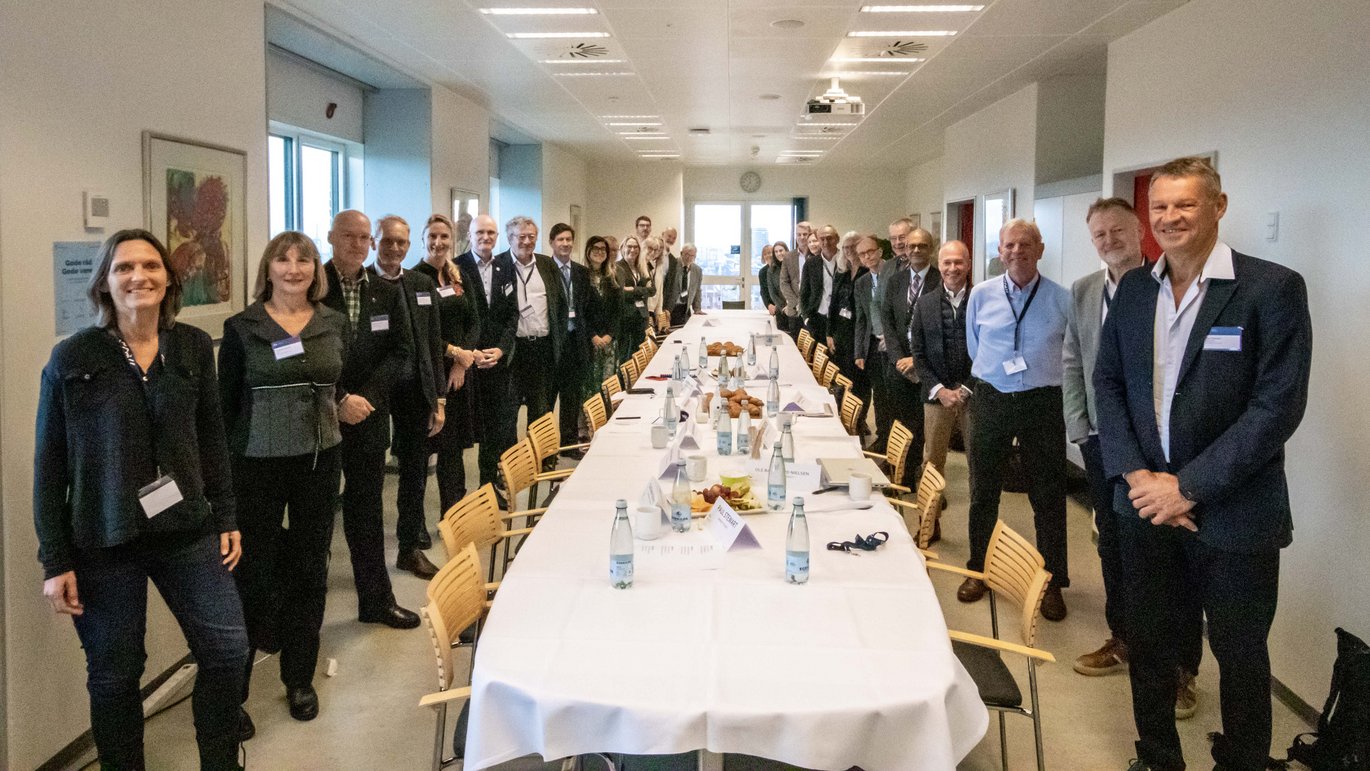Visit of the Advisory Board, with good advice and concrete suggestions
When Health’s international Advisory Board visited the faculty in November, the points on the agenda were interdisciplinarity, business collaboration and evaluation of research quality ¬– but there was also room for good advice and strategic discussions in the two-day visit.

A packed programme had been drawn up when the members of Health’s Advisory Board gathered to advise the faculty management and the individual departments.
The panel consists of 21 researchers and research directors from educational institutions in Great Britain, Norway, Sweden, Serbia, France, Germany, Belgium, USA and Denmark. The Advisory Board visits the faculty every second year. This year business collaboration, research evaluation and interdisciplinarity were the three main topics, but the two-day meeting also provided an opportunity to touch on other important themes, says Dean Anne-Mette Hvas:
“It’s been very fruitful to have the Advisory Board visit us. It provides a unique opportunity to spar with talented colleagues from other research-intensive universities in Europe. It was confirmed for us that there are some things that we do really well, and other areas where we can still develop and become even better. Amongst other things, it was emphasised that we must continue to strengthen the frameworks for achieving good interdisciplinary research collaboration, both internally and with external partners.”
In 2024, Health is due to conduct a major research evaluation. How this could be approached was also among the topics discussed at one of the programme’s workshops. Here, the advice was amongst other things to focus on the visions for the future, communicate about the process and its purpose, and lay down a time perspective. With regard to interdisciplinary collaboration, it was emphasised that it is important to think beyond the walls of the faculty itself and collaborate with, for example, engineers, mathematicians or philosophers, where this can be of benefit.
Praise and advice for the departments
During the visit, the individual members of the Advisory Board were paired with a department, which they were given the opportunity to visit in order to provide concrete advice and input. Here are some of the main points from the Advisory Board’s input:
Department of Biomedicine
- Is there sufficient correlation between the Bachelor and Master’s parts of the medical degree programme? If you look at the curriculum, it seems very divided.
- Be careful not to invest in an innovation building if it means that the other environments are drained of creativity. Innovation should be incorporated into all research environments and degree programmes.
- Do you have sufficient incentives in relation to teaching? How do you make sure that the academic staff prioritise – and are recognised for – this area?
Department of Clinical Medicine
- Recruitment is a major challenge, e.g. in relation to the diversity and age distribution among the department’s academic staff.
- The medical degree programme must equip students with the ability to develop scientific thinking and an approach to the available knowledge, and at the same time give them a range of clinical skills that will enable them to perform as doctors in clinical practice.
- It is important to continue to develop research at the regional hospitals and to strengthen the focus on innovation and entrepreneurship.
Department of Dentistry and Oral Health
- Ensure interdisciplinarity, including in the study programmes.
- Create managerial and strategic frameworks that will reward research collaboration.
- Great praise for the ‘Aarhus Model of Dental Education’ – including for the speed of implementation.
Department of Public Health
- We must bring the department’s professional diversity into play to a greater extent. This is a strength.
- We must develop more opportunities for internal collaboration at the department.
- We must work towards common goals, and put extra resources into the work towards these goals. This could, for example, include work on the major applications for funding or EU grants.
Department of Forensic Medicine
- One method for formulating forensic research questions arises through those cases that give rise to perplexity because they cannot be solved with our current knowledge and methods.
- To a greater extent than at present, the structure of a well-functioning co-operation organisation between the forensic medicine departments and its partners should include the prosecution service, who are the actual recipients of forensic medical declarations.
- Issues of personal data are interpreted and handled very differently in the EU countries, despite the fact that we are all subject to the same legislation.
The faculty management team and the departments will now work on the many inputs they have received within research, teaching and co-operation. The next visit of Health’s Advisory Board to the faculty is scheduled for 2024.